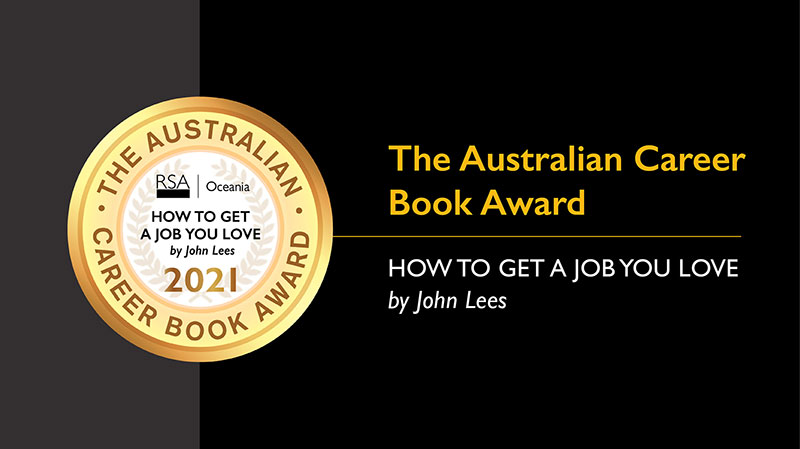
The 2021 awarded book for The Australian Career Book Award – hosted by RSA Oceania – is How to get a job you love by John Lees. John is a well-known British career coach and career writer, and his book has significant presence in Australia. The book was selected from the 12 award Finalist Books for its capacity to help people manage career and work life in a re-invented economy. John has also provided a short video touching on work futures. This review is by Warren Frehse – a Senior Advisor in careers and employability at The University of Melbourne, and an established career author himself.
Some career books are written to inspire others towards living their dream. There’s nothing wrong with that of course, but when a book is able to do that as well as provide the practical exercises and roadmap on how to get to as close to that as possible, it’s worth a deep dive.
Author John Lees is no stranger to those in the career development game. He has published fifteen books, and his latest, How to Get a Job You Love, is in its 11th edition with COVID and its subsequent impact on the changing world of work making its most untimely debut.
As well as being mentored by Richard Nelson Bowles of What Colour Is Your Parachute? fame, the author states boldly on his website that “all work is a deal, a compromise between what you want out of life and what an employer wants to get out of you.”
That sets the scene for the content of this book. Steeped in realism about the fragility of work, it is more about helping people work in something perhaps more stimulating and enjoyable than what they may be currently doing. The clear message is to actually ‘do something’ rather than contemplate excessively what might be.
Filled with evidence-based exercises, the author allows the reader to choose what to include on their own action plan by providing a ‘must do’ list at the conclusion of each chapter. Its clear and ‘no nonsense’ approach gives compelling reasons for the reader to hit the ground running.
Each of the topics comes complete with a comprehensive reference list and index that makes it easy for the reader to pick up and refer to long after the initial immersion. This would work even better if the book could be a compact pocket size to carry in a bag for quick reference.
One particular chapter, “The 4-hour Job Search Programme”, could have been a catchy book title in itself, so for the impatient job seeker, this has all the ingredients and necessary tips to avoid doing things that can make a job search go longer than it absolutely needs to.
This is particularly important for a job seeker in transition where time spent in between jobs means loss of income and confidence.
The author nicely weaves the language of recruiters and employers into the text. He gives job candidates clues on what they mean by “market readiness” which he defines as “a state of preparedness that means you’re ready to make the most of opportunities and you can safely be put in front of decision-makers.”
Feeling safe to face a decision maker is something that every job seeker would need in large quantities, especially in challenging times.
This title provides the know-how to do that by providing job seekers with much-needed consolation and confidence to find a job “worth getting up for on a cold Monday morning.”
Review by Warren Frehse, University of Melbourne